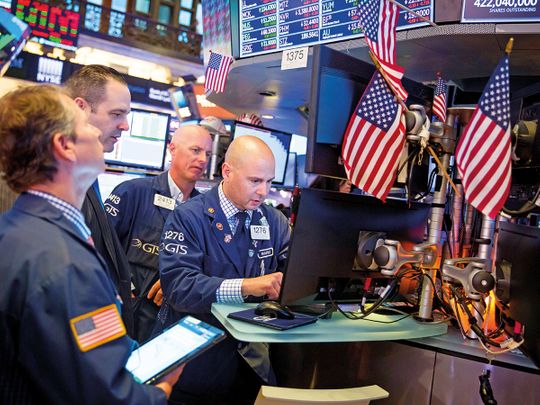
Dubai: Global trends are seen guiding stock markets this week, and analysts caution that this means benchmarks worldwide may witness brief spells of volatility in the days running up to the year’s end.
As investors keep an eye on macro world trends, they will be specifically eyeing updates over the new virus strain and progress on vaccination to derive cues for further movement.
Brexit deal buoy sentiments
However, looking ahead, analysts view that markets are likely to maintain its positive momentum on the back of abundant liquidity, effective vaccine rollout and a momentous Brexit deal.
The UK reached a historic trade deal with the European Union late last week. However, analysts also caution that emerging risk pertaining to new coronavirus strain in many parts of Europe may limit market upside.
The stock market appears set on rising into 2021 — a year expected to see some return to normalcy, above trend economic growth and a higher stock market, according to Wall Street strategists.
Even with this year’s sharp sell-off, the S&P 500 is notching a near 15 per cent gain for 2020. For 2021, many strategists expect another year of double-digit gains.
Will there be a Santa rally?
In three of every four years, the market sees an end-of-year Santa rally, but some analysts are also waiting to see trading in the first five days of January for signs of how the market could trade in 2021.
If the market is higher in the first five days, history shows the S&P 500 has been up 82 per cent of the time for the full year with an average 12.5 per cent gain.
Many investors consider Asia as the region with one of the best economic prospects next year thanks to its relatively better control of the coronavirus outbreak. But a recent surge in COVID cases in some countries threatens to dim the region’s economic outlook, some analysts have warned.
In the US, the S&P 500 registered a 0.2 per cent loss last week amid profit-taking action into the year-end. The 30-stock Dow eked out a 0.1 per cent gain for the week.
The Nasdaq rose 0.4 per cent this week, while the Russell 2000 advanced 1.6 per cent for its eighth straight week of gains — the longest weekly winning streak since February 2019.
UAE indices drop at the start of the week
While major Gulf stock markets largely traded mixed at the start of the last week of trading for the year, UAE stocks ended lower on Sunday.
The Dubai Financial Market (DFM) ended down 0.46 per cent at 2,515 points, while the Abu Dhabi Securities Exchange (ADX) dropped 0.59 per cent at 5,095 points at open.
Lenders Emirates NBD and Dubai Islamic Bank were down 0.9 per cent and 0.6 per cent, respectively, while real estate developer Emaar Properties was up 0.6 per cent. In Abu Dhabi, Emirates Telecommunications Group fell 1 per cent.
Elsewhere, the Saudi index was up 0.5 per cent, the Qatari index was up 0.25 per cent and the benchmark in Oman was up 0.4 per cent on Sunday. However, Kuwait’s main gauge was down 0.3 per cent.
During the course of the year, Saudi Arabia’s benchmark index has gained 4 per cent this year, Abu Dhabi and Qatar are up 1 per cent, while Dubai is down 8.8 per cent. Gains in recent weeks have been fuelled by optimism over COVID-19 vaccines.








